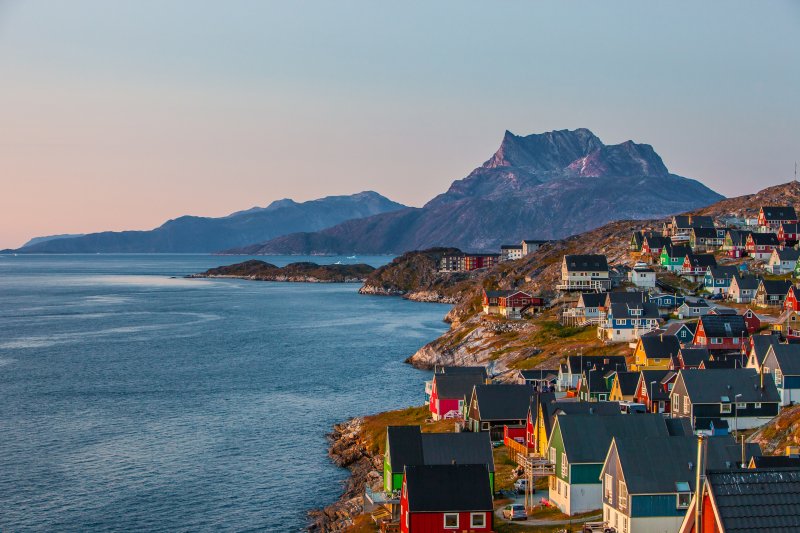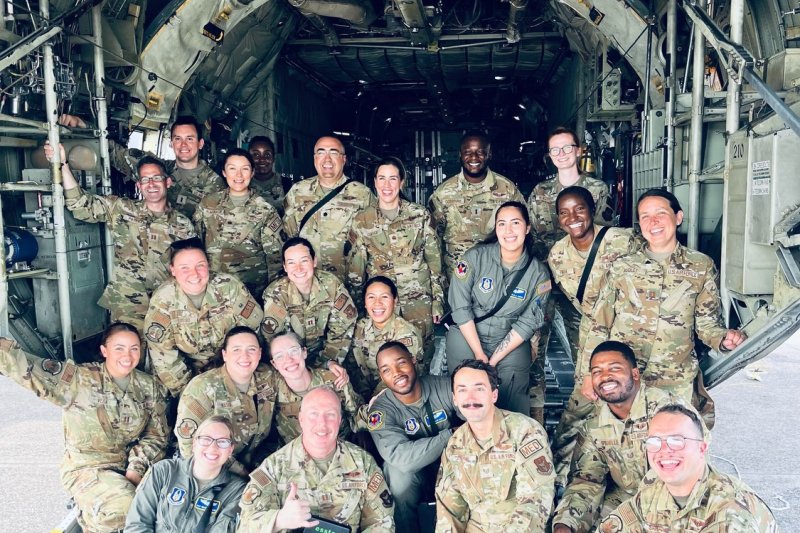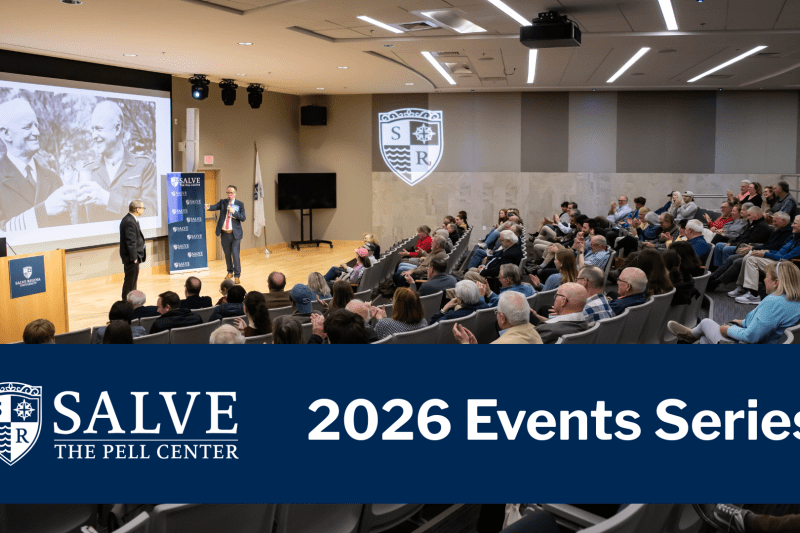
Setting the stage for a career in theater
Behind-the-scenes work on an immersive musical takes Anna Annese ’26 a step closer to solo producing.
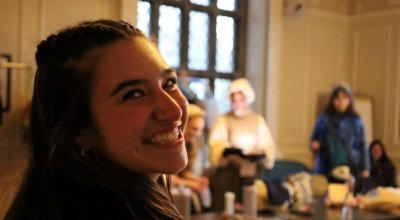
Staging a theater production is a complex undertaking. It’s one of those things you can’t learn by reading about or even by hearing the experiences of veteran producers. You just have to dive in. For Anna Annese ’26, a theatre arts major with a music minor, that’s exactly what she did in November 2025 when she took on the role of assistant production manager for Salve Regina University’s fall musical, “Natasha, Pierre & the Great Comet of 1812,” shadowing Salve theatre arts producer and assistant professor Dr. Tara Brooke Watkins, who directed the show.
Making the challenge even more daunting, the show was an interactive production – staged in Salve’s Ochre Court, the Gilded Age mansion at the heart of campus. The audience, seated cabaret style, was invited to participate in the party taking place simultaneously in a nightclub and Russian aristocratic estate. All architectural elements of the space were used as set pieces.
For Annese, the experience fulfilled the required research component for her upcoming senior thesis project, which is to solo-produce Salve’s spring production. As Watkins explains, though, “Projects aren’t just academic requirements. They’re designed to set students up for jobs after graduation.”
We sat down with Annese to talk about her experience on the show and her progression through the Salve theater program.
Q: What did you do as the assistant production manager?
A: My responsibilities on “Natasha, Pierre & the Great Comet of 1812” began in pre-production, meeting with the director to plan audition details and logistics. Throughout the rehearsal process, I was responsible for scheduling rehearsal spaces around campus that were suitable for the work being done that day, running weekly production team meetings with the designers and handling any other issues/tasks that needed tackling. I also worked as the assistant lighting designer on the production and worked very closely with the technical theater team here at Salve.
Q: What made you decide to focus on producing the show rather than performing in it?
A: I have been very lucky to perform in all three of the musicals that have run during my time at Salve so far. My favorite aspect of the theater arts program here at Salve is its focus on holistic theater. Our students take classes in all different areas of interest in theater, ranging from stagecraft to realism in acting, to multicultural drama and performance to documentary theater. This summer, while preparing to go into my senior year, I realized I wanted to take advantage of the wonderful resources and faculty we have here in the theater department. I met with Tara and explained what I was interested in, and she suggested I shadow her on this production and produce the spring show on my own. I am so grateful that Salve has opened my mind to what theater can be and what I can do to be a part of it other than just performing.
Q: What do you want to do in your career?
A: I hope to combine everything I have learned at Salve into a long-lasting, sustainable career. My first engagement with theater was performing at three years old. I will always love that side of the art. But Salve’s theatre arts program taught me that I also enjoy directing, choreographing, writing work, community engagement partnerships, social justice theater, applied theater and so much more. I feel prepared to go into the world not only as a theatre professional, but as an open-minded person. In my career, I hope to combine all of these aspects of theater to make a change in audiences by using art.
Q: This show isn’t a typical theater performance – it’s an immersive production. What does that mean and what different challenges did that pose than a ‘regular’ show?
A: Yes, this show was a wonderful example of immersive theater. The show was performed in Ochre Court, not a traditional theater space. We set up cafe tables and chairs for the audience to sit at. We sold so many tickets weeks before opening, that we then decided to open the second-floor balcony for standing room only seating. The actors interacted with the audience members who consented to this form of engagement. The interactions were everything from pulling them up to dance, having them hold props in a scene and asking them to give up their seat for a song. On my end of things, the difficulties of this production were in the set-up of space and respecting those who work there during the day. I assisted in working out what dates were best to bring in our equipment and what days we could keep our set up and what days we could not. We are so thankful to the entire event team and those at Ochre Court who were so flexible with us and made this wonderful production happen in that space!
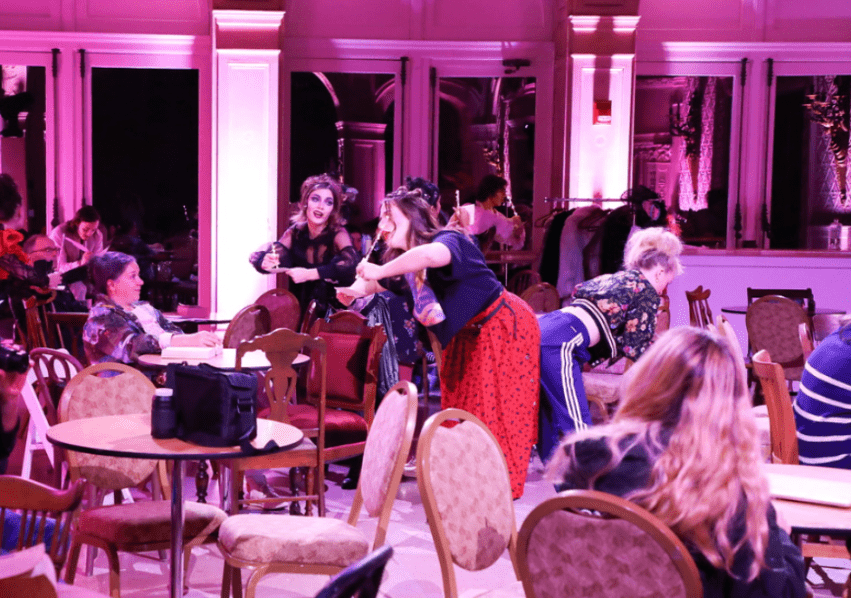
Q: How was it to shadow Tara Brooke Watkins as you prepare to be the lead producer on the spring show?
A: I am so lucky to have Tara to learn from and observe. The amount of detail and care she puts into every aspect of theater here at Salve is so admirable and something I hope to bring into my future career.
Q: What are some of the big takeaways you have from your production role on this show?
A: The most significant takeaway I gained from my production role on this show is the importance of every person that works to create a high-quality performance. I did not realize how much of an impact my role would have on the final product of the show. It solidified for me that I can make a difference by contributing to theater in other ways than performing. Audiences do not get to experience the magic of live performances without all the people that work tirelessly behind the scenes for weeks leading up to opening night. These jobs are valuable and the backbone to what keeps theater alive.
Q: Do you feel the theatre arts program at Salve is helping to set you up for a career?
A: I am so thankful to have the education and knowledge the theatre arts program at Salve has given me these past four years. Here, students are prepared to take on any role within the theater space, and in other fields as well. We are learning transferable skills that are setting me up for a career in any path I wish. Whether that be performing, producing or directing, I know my foundational skills learned at Salve will support me in every room I walk into.

